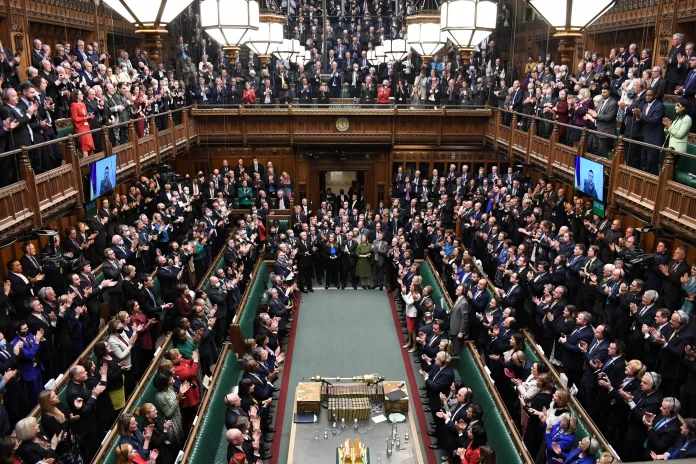- Government dodges questions yet again on ESO reform
- Cross-party support voiced for 1-year SAYE
- Labour MP questions minister on widening schemes for gig economy workers
- ProShare renews calls for a Government-led all-employee share scheme review
Following a debate in Parliament about reforming Employee Share Ownership (ESO) schemes, Murray Tompsett, Head of ProShare said the government was “continuing to bury its head in the sand by ignoring the strong case for reform of the UK’s all-employee share schemes”.
Labour MP Sir George Howarth secured the debate in Westminster Hall, during which he made the case directly to the Government that ESO reform was “long overdue”. Linking ESO reform to the cost-of-living crisis, he pointed out that reformed plans could support more employees and their families through the difficult economic times ahead, saying:
“As we face a cost of living crisis and higher levels of inflation, we should be looking at creative solutions to support people in work. Why not… support lower-income employees by allowing offers of free shares to this group only, which would relieve legitimate financial concerns?”
Howarth also floated the idea of a one-year SAYE scheme, during the debate on 6th September, suggesting government could, “create a one-off SAYE that lasts for just one year, instead of the current three or five years? That would enable people to make regular savings but allow them to take their savings back if they struggle to pay the bills. At the same time, it offers a potential return at the end of the year in the form of either interest or a share price increase.” There was support for this idea. James Cartlidge MP said he was “persuaded” by the idea and that “a shorter qualifying period, perhaps with other conditions, would be reasonable, given that the employee may have the best intentions of staying longer but the labour market has changed.”
Luzy Frazer MP, the Treasury minister replying for the government, said that if evidence “could be presented” about how a one-year SAYE would impact on scheme take-up, then “the Treasury would be very interested in looking at that”.
Labour MP Alex Sobel, asked government to consider adapting the design of schemes to allow participation from people working in the gig economy. He said: “The nature of work is changing: more and more people are in the so-called gig economy – platform workers – where they are not on pay-as-you-earn. They therefore cannot take part in such schemes. Should the Government update the schemes so that those workers, and not just workers on PAYE, can take part in them?”
Tompsett said that ministers “missed an open goal by continuing to reject legitimate calls for a government-led consultation into reform of SIP and SAYE plans, although the cross-party support for exploring a 1 year SAYE is one that ProShare will take forward with the industry.” He added: “Over the last two years we’ve been lobbying the Treasury to introduce some simple technical reforms to the SIP and SAYE rules. It’s vital we continue to press for these reforms – including reducing the SIP holding period from 5 to 3 years – which we believe would significantly increase employee participation, as well as encouraging more organisations to offer SIPs to their workforce. So whilst it’s disappointing that we’ve not seen any real progress today, ProShare will continue to lobby the new government on this vital issue.”
In recent months the Government has been undertaking a review of EMI and CSOP – two of the UK’s discretionary employee share plans – typically only offered to management levels and above. So far they have declined to include SIP and SAYE within the scope of this review. However, in recent correspondence, seen by ProShare, between the Treasury and a supportive backbench MP, the Government has shifted its position regarding a wider assessment saying now that the Treasury is ‘keen to first understand the outcome of this review, which may suggest a wider review would be beneficial’, adding that ‘We would be very interested in investigating further how far greater use of share options is correlated with company success.’
Tompsett echoed Howarth’s calls for a government-led review of ESO plans, adding: “One of the most important benefits of all-employee share plans, particularly as we head into the cost-of-living crisis, is the enhanced financial resilience for plan participants. Our annual survey, issued in August, established that the weighted average value of a SIP participant’s holding is a healthy £10,294. Employee share plans and share ownership can clearly play a vital role in boosting employees’ financial resilience in these most challenging of times.”
“Last year, ProShare sponsored a key report from the Social Market Foundation – ‘A stake in success – Re-imagining employee share plans for the 2020s’ – which demonstrated that employees participating in ESO plans are significantly better off compared to non-participants in the same income bracket. Increasing employees’ financial independence and decreasing reliance on the state has never seemed like such a sensible solution.
“By reviewing these plans in a piecemeal manner we risk allowing SIP and SAYE – open to all employees on equal terms – being left behind and atrophying. SIP and SAYE need to be properly reviewed by the Government at the earliest opportunity so that ministers can develop a range of employee share ownership opportunities fit for modern employment trends.”
The debate was the first time Parliament has debated ESO reform since 2018, when Lord Haskell tabled a debate in the House of Lords.
Help keep news FREE for our readers
Supporting your local community newspaper/online news outlet is crucial now more than ever. If you believe in independent journalism, then consider making a valuable contribution by making a one-time or monthly donation. We operate in rural areas where providing unbiased news can be challenging. Read More About Supporting The West Wales Chronicle


























